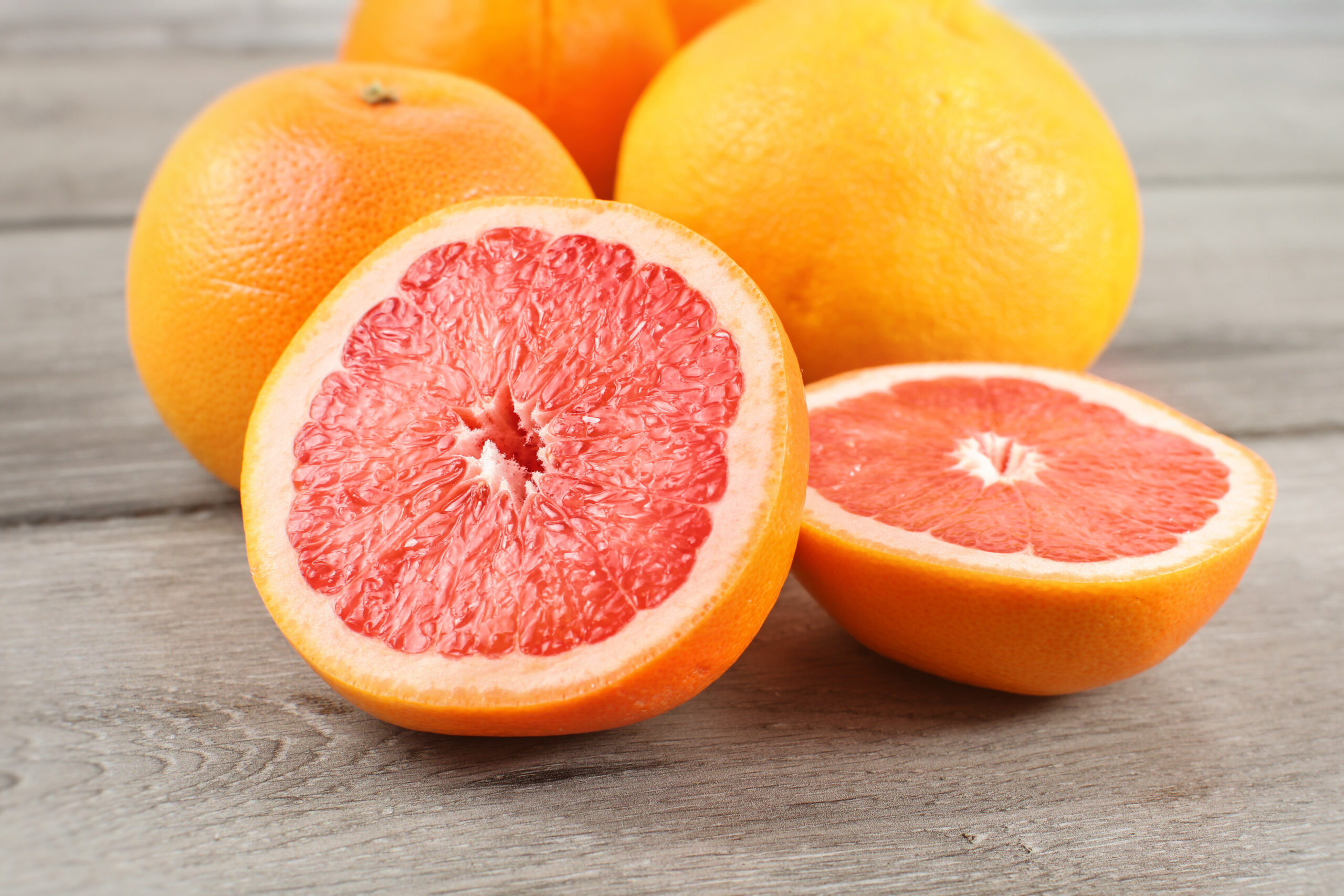In This Article
Toggle
In This Article
ToggleGrapefruit is a nutrient-rich citrus fruit known for its refreshing taste and impressive health benefits. Packed with vitamin C, antioxidants, and fiber, it supports immunity, aids digestion, and promotes heart health.
Also known as Citrus × paradisi, grapefruit belongs to the Rutaceae (citrus family). It is believed to have originated in the 18th century as a natural hybrid between the pomelo (Citrus maxima) and the sweet orange (Citrus sinensis). First discovered in Barbados, grapefruit later gained popularity in the Caribbean and Florida, USA.
Today, it is grown in many parts of the world, especially in warm regions with well-drained soils, which provide the ideal conditions for grapefruit trees to thrive.
Whether eaten fresh, juiced, or added to salads, grapefruit is a delicious and nutritious addition to any diet.
This guide delves into grapefruit benefits for health, its nutritional value and how to incorporate it into your diet.
Nutritional Value
One cup (230 grams) of sections of grapefruit following nutrients:
- Calories: 96.6 kcal
- Protein: 1.77 g
- Total Fat: 0.32 g
- Carbohydrates: 24.6 g
- Sugars: 15.8 g
- Fiber: 3.68 g
- Potassium: 310 mg (7% Daily Value (DV))
- Copper: 0.074 (8% DV)
- Thiamin (B1): 0.099 mg (8% DV)
- Riboflavin (B2): 0.071 mg (5% DV)
- Pantothenic acid (B5): 0.60 mg (12% DV)
- Vitamin B6: 0.122 mg (7% DV)
- Folate: 30 µg (7% DV)
- Vitamin C: 71.8 mg (80% DV)
- Vitamin A: 133 µg (15% DV)
Health Benefits
Here are the grapefruit benefits for health.
1. May Boost Immunity
One of the standout benefits of grapefruit is its high vitamin C content.
A 100 gram serving of grapefruit offers significant amount of vitamin C, which is 31.2 mg or 34% of the DV of vitamin C, helping you meet the daily needs of vitamin C.
Vitamin C is a powerful immune booster that supports both innate and adaptive immunity. And a deficiency of vitamin C is linked to weakened Immunity, making you more vulnerable to infections.
It strengthens the skin’s defense against pathogens, fights oxidative stress, and helps immune cells like neutrophils track and destroy harmful microbes.
Additionally, vitamin C supports B- and T-cell production, which are essential for long-term immunity.
Fortunately, grapefruit is rich in this vitamin, serving as an excellent dietary choice to enhance immune function.
Regular consumption of vitamin C can help reduce the duration and severity of colds and other infections, especially during the winter season.
2. May Aid in Weight Management
Grapefruits is low in calories and high in water content, making it a satisfying option that can help control hunger and reduce overall calorie intake. Its fiber content also promotes satiety, further aiding weight loss efforts.
Grapefruit has been linked to weight loss in multiple studies.
A study on 85 obese adults found that consuming grapefruit, grapefruit juice, or water before meals, along with calorie restriction, led to a 7.1% weight loss and a 4.5 cm reduction in waist size over 12 weeks. While all groups lost weight, only the grapefruit and juice groups showed an increase in HDL (‘good’) cholesterol, whereas the water group did not.
Although the difference is not much, still grapefruits may be helpful in your weightloss journey as it is a low-caloric fruit.

3. May Support Heart Health
Grapefruit is a rich source of flavonoids, natural compounds linked to improved heart health.
A preclinical study suggests that naringin (98% of the grapefruit flavonoids) had stronger heart-protective effects than pure naringenin.
Meanwhile, a computer-based study found that while naringenin stabilized heart rhythm, it also increased the risk of irregular heartbeats (arrhythmia) at higher heart rates, particularly in female cells.
Grapefruit has also been clinically shown to reduce blood pressure and inflammation, improve cholesterol levels, and support heart health.
For instance, a study on postmenopausal women found that flavanones in grapefruit juice may reduce arterial stiffness. The juice modified gene and miRNA expressions, regulating inflammation, immunity, and cell interactions. These changes were linked to lower arterial stiffness and hypertension risk, possibly through key proteins like STAT3 and NF-κB.
Additionally, the previously mentioned study found that consuming grapefruit and grapefruit juice led to significant increases in HDL-cholesterol, suggesting its cardiometabolic benefits in addition to weight loss.
While these findings are promising, more clinical research is needed to fully understand and confirm grapefruit’s cardiovascular benefits.
4. Antioxidant and Anti-inflammatory Properties
Many of grapefruit’s health benefits come from its rich antioxidant profile, which helps combat oxidative stress, neutralize free radicals, and protect cells.
Along with vitamin C, grapefruit contains polyphenolics, powerful bioactive compounds found in citrus fruits. Among them, grapefruits are exceptionally rich in flavanones (a subgroup of flavonoids), known for their strong antioxidant and anti-inflammatory properties.
Grapefruits are also a good source of carotenoids, the compounds responsible for its yellow, orange, and red colours.
Additionally, grapefruit has notable anti-inflammatory properties. Chronic inflammation is a major factor in diseases like cancer, diabetes, arthritis, and heart disease.
Citrus polyphenolics help fight inflammation by interacting with key enzymes and receptors involved in the body’s immune response.
A study on mice explored whether grapefruit juice could enhance the effects of aripiprazole, an antipsychotic drug, by improving its bioavailability and antioxidant potential. The results showed that combining grapefruit juice with aripiprazole reduced oxidative stress and inflammation more effectively than aripiprazole alone.
This suggests that grapefruit juice may help lower the required dosage of aripiprazole and reduce its side effects.
5. May Enhance Skin Health
Grapefruit is rich in polyphenols and vitamin C, making it a powerful skin-friendly fruit.
Polyphenols and vitamin C helps eliminate free radicals, protecting cells, tissues, and DNA from oxidative stress. Vitamin C also plays a key role in collagen production, which maintains skin elasticity and firmness, helping to reduce signs of aging.
Evidence suggests that eating grapefruit may help protect your skin from the harmful UV rays of the sun.
A study involving 90 participants tested whether a rosemary and grapefruit extract supplement (Nutroxsun™) could protect the skin from UV damage and improve wrinkles and elasticity. Results showed reduced sun-induced redness and skin damage, with benefits appearing in as little as 2 weeks. The effects were linked to antioxidant and anti-inflammatory actions.
Not just eating of grapefruits promote a healthy skin, its peels are also rich in flavonoids, which may provide antioxidant, anti-inflammatory, and anticancer properties when applied topically.
Incorporating grapefruit into your diet or its peel into your skincare routine can nourish your skin inside out, promoting a healthier, more youthful, and radiant complexion.
6. May Reduce the Risk of Cancer
Cancer still remains one of the leading causes of death worldwide.
Grapefruit is rich in antioxidants and flavonoids, which help protect cells from damage that may lead to cancer.
One key compound, bergamottin, a furanocoumarin found in grapefruit, has demonstrated strong antioxidant, anti-inflammatory, and anti-cancer properties.
Cellular and animal studies suggest that bergamottin shows promising anti-cancer effects against various cancers, including skin cancer, myeloma, leukemia, and lung cancer, making it a potential candidate for cancer prevention and treatment.
Grapefruit also contains other fumorocoumarins, which has similar health-promoting properties.
However, more human research is needed to fully understand its absorption, dosage, long-term safety, and possible side effects before it can be considered for medical use.
And a review of preclinical and observational studies found that citrus juices and their extracts (including grapefruit) may have potential in cancer prevention, though further research, including clinical trials, is needed to confirm their effectiveness.

7. May Promote Bone Health
Osteoarthritis is a major health concern for aging people affecting nearly 50% of people aged older than 65 years, which leads to joint pain and chronic disability.
Grapefruit is high in flavonoids (like naringin, naringenin, and hesperidin), limonoids, and vitamin C, which provide antioxidant and anti-inflammatory benefits that support bone and joint health.
A study on rats with osteoarthritis tested the effects of high and low doses of grapefruit juice. Both doses reduced inflammation, slowed cartilage damage, and improved joint function, with the higher dose showing stronger protective effects, similar to the anti-inflammatory drug diclofenac sodium.
Grapefruit compounds may also help relieve pain by blocking prostaglandins, hormone-like chemicals that regulate pain and inflammation in the body.
Grapefruit has been shown to promote bone health. For instance, a study on male mice found that maternal consumption of hesperidin and naringin during pregnancy and lactation improved bone structure and density in offspring, especially in the tibia, femur, and vertebrae, with effects lasting up to 6 months. However, this sex-specific benefit differed from previous findings in female mice.
There is also clinical evidence showing the bone-protective properties of grapefruit or its compounds.
So, drinking a glass of grapefruit juice regularly may help strengthen your bones, support joint health, and potentially relieve joint pain.
8. May Help Manage Blood Sugar Levels
Grapefruit has a low glycemic index, meaning it does not cause a rapid spike in blood sugar levels. This makes it a suitable fruit for individuals with diabetes or those managing their blood sugar levels.
Grapefruit has been linked to improved insulin sensitivity, which can help manage blood sugar levels. Several studies have shown that consuming grapefruit can reduce insulin resistance.
Grapefruits are rich in flavonoids, which reduce insulin resistance, inflammation, and oxidative stress, with some flavonoids showing natural blood sugar-lowering effects in diabetes.
Flavonoids can also help manage blood sugar levels by boosting insulin production, supporting pancreatic beta-cell growth, improving glucose absorption, and activating AMP-activated protein kinase.
Consuming grapefruit can help keep blood sugar levels stable, reducing the risk of insulin resistance and related complications.
9. May Lower the Risk of Kidney Stones
Kidney stones are a painful condition that can also be prevented with the right diet.
The citric acid (usually found in citrus fruits) in grapefruit increases the pH of your urine and its volume, creating an environment that makes it harder for kidney stones to form.
Citric acid also binds to calcium in the urine, preventing it from binding with oxalate or phosphate to form crystals, which reduces the formation of calcium oxalate and calcium phosphate stones, which are the most common types of kidney stones.
However, a 2021 review examined the link between citrus juices (orange, grapefruit, and lemon) and kidney stone disease. Three large studies found grapefruit juice increased kidney stone risk, while orange juice did not. Ten smaller clinical studies showed that all three juices increased urinary citrate, which helps prevent stones. However, only orange and grapefruit juices alkalized urine, while lemon juice had a weaker protective effect.
These mixed results suggest more research is needed before making recommendations, and the high carbohydrate content of citrus juices should be considered.

Practical Tips for Incorporating Grapefruit into Your Diet
Here are some practical tips to enjoy grapefruit benefits.
- Breakfast Boost: Add grapefruit slices to your morning yogurt or cereal for a refreshing and nutritious start to your day.
- Salad Enhancer: Incorporate grapefruit segments into salads for a burst of flavor and a vitamin C boost.
- Healthy Snack: Enjoy a half grapefruit as a mid-morning or afternoon snack to keep you energized and full.
- Juicing: Use fresh grapefruit juice in smoothies or as a base for healthy, homemade salad dressings.
Precautions and Potential Side Effects
Digestive Issues:
Can cause stomach discomfort, acid reflux, or diarrhea, especially in people with acid sensitivity.
Potential for Dental Erosion:
Regular consumption of grapefruit, especially in acidic juice form, may contribute to dental erosion over time. Whenever you are going to consume grapefruit or grapefruit juice remember these:
- Never put citrus fruits like grapefruit directly on teeth.
- Rinse your mouth immediately after eating the fruit, and brush your teeth after 30 minutes.
May increase the risk of kidney stones diseases:
Although debated, some studies suggest that excessive consumption of grapefruit, especially in certain individuals prone to kidney stones, may increase the risk of stone formation.
Drug Interactions:
While grapefruit benefits for health are numerous, it’s important to be aware of potential interactions with certain medications.
Grapefruit can interfere with enzymes that metabolize various drugs, leading to higher levels of the medication in the bloodstream and potentially causing adverse effects.
The most common drugs that interact with grapefruit or grapefruit juice include:
- Blood pressure and heart medications (including calcium channel blockers and anti-arrhythmic drugs)
- Antimicrobials (such as certain antibiotics, antivirals, and anti-parasitics)
- CNS drugs (including benzodiazepines, antidepressants, antipsychotics, anti-epileptics, and anti-anxiety drugs)
- Antihistamines and serotonin analogs
- Statins and other cholesterol-lowering drugs
- Cancer and immunosuppressive drugs
It is essential to consult your doctor before taking these medications. If you are prescribed any of these drugs, avoid grapefruit or grapefruit juice for atleast 3 days before and during the course of treatment to prevent harmful interactions.
Takeaways
Grapefruit is a nutritional powerhouse, packed with health benefits backed by science. From strengthening immunity and promoting weight loss to supporting heart health and enhancing skin glow, this citrus fruit is a refreshing and nutritious addition to your diet.
However, it’s important to be mindful of potential side effects such as tooth erosion or medication interactions—consult a healthcare professional if needed.
Adding grapefruit to your daily routine is a delicious and effortless way to nourish your body and boost overall well-being. So, enjoy its tangy, refreshing taste while reaping its many health benefits!
You may also read
5 Simple Healthy Smoothie Recipes
A List of Dry Fruits: 8 Types of Nutritional Bounties
9 Incredible Wood Apple Benefits
- U.S.Department of Agriculture: FoodData Central – Grapefruit, raw, pink and red, all areas
- Carr AC, Maggini S. Vitamin C and Immune Function. Nutrients. 2017 Nov 3;9(11):1211. doi: 10.3390/nu9111211. PMID: 29099763; PMCID: PMC5707683.
- Silver HJ, Dietrich MS, Niswender KD. Effects of grapefruit, grapefruit juice and water preloads on energy balance, weight loss, body composition, and cardiometabolic risk in free-living obese adults. Nutr Metab (Lond). 2011 Feb 2;8(1):8. doi: 10.1186/1743-7075-8-8. PMID: 21288350; PMCID: PMC3039556.
- Flori L, Albanese L, Calderone V, Meneguzzo F, Pagliaro M, Ciriminna R, Zabini F, Testai L. Cardioprotective Effects of Grapefruit IntegroPectin Extracted via Hydrodynamic Cavitation from By-Products of Citrus Fruits Industry: Role of Mitochondrial Potassium Channels. Foods. 2022 Sep 11;11(18):2799. doi: 10.3390/foods11182799. PMID: 36140927; PMCID: PMC9497567.
- Sutanto, H.; Hertanto, D.M.; Susilo, H.; Wungu, C.D.K. Grapefruit Flavonoid Naringenin Sex-Dependently Modulates Action Potential in an In Silico Human Ventricular Cardiomyocyte Model. Antioxidants 2022, 11, 1672. https://doi.org/10.3390/antiox11091672.
- Krga I, Corral-Jara KF, Barber-Chamoux N, Dubray C, Morand C, Milenkovic D. Grapefruit Juice Flavanones Modulate the Expression of Genes Regulating Inflammation, Cell Interactions and Vascular Function in Peripheral Blood Mononuclear Cells of Postmenopausal Women. Front Nutr. 2022 May 26;9:907595. doi: 10.3389/fnut.2022.907595. PMID: 35694160; PMCID: PMC9178201.
- Pruteanu LL, Bailey DS, Grădinaru AC, Jäntschi L. The Biochemistry and Effectiveness of Antioxidants in Food, Fruits, and Marine Algae. Antioxidants (Basel). 2023 Apr 2;12(4):860. doi: 10.3390/antiox12040860. PMID: 37107235; PMCID: PMC10135154.
- Souyoul, S.A., Saussy, K.P. & Lupo, M.P. Nutraceuticals: A Review. Dermatol Ther (Heidelb) 8, 5–16 (2018). https://doi.org/10.1007/s13555-018-0221-x.
- Ben Hsouna A, Sadaka C, Generalić Mekinić I, Garzoli S, Švarc-Gajić J, Rodrigues F, Morais S, Moreira MM, Ferreira E, Spigno G, Brezo-Borjan T, Akacha BB, Saad RB, Delerue-Matos C, Mnif W. The Chemical Variability, Nutraceutical Value, and Food-Industry and Cosmetic Applications of Citrus Plants: A Critical Review. Antioxidants (Basel). 2023 Feb 14;12(2):481. doi: 10.3390/antiox12020481. PMID: 36830039; PMCID: PMC9952696
- Zargar S, Al-Majed AA, Wani TA. Potentiating and synergistic effect of grapefruit juice on the antioxidant and anti-inflammatory activity of aripiprazole against hydrogen peroxide induced oxidative stress in mice. BMC Complement Altern Med. 2018 Mar 23;18(1):106. doi: 10.1186/s12906-018-2169-x. PMID: 29566693; PMCID: PMC5865358.
- Nobile V, Michelotti A, Cestone E, Caturla N, Castillo J, Benavente-García O, Pérez-Sánchez A, Micol V. Skin photoprotective and antiageing effects of a combination of rosemary (Rosmarinus officinalis) and grapefruit (Citrus paradisi) polyphenols. Food Nutr Res. 2016 Jul 1;60:31871. doi: 10.3402/fnr.v60.31871. PMID: 27374032; PMCID: PMC4931025.
- Ko JH, Arfuso F, Sethi G, Ahn KS. Pharmacological Utilization of Bergamottin, Derived from Grapefruits, in Cancer Prevention and Therapy. Int J Mol Sci. 2018 Dec 14;19(12):4048. doi: 10.3390/ijms19124048. PMID: 30558157; PMCID: PMC6321104.
- Cirmi S, Maugeri A, Ferlazzo N, Gangemi S, Calapai G, Schumacher U, Navarra M. Anticancer Potential of Citrus Juices and Their Extracts: A Systematic Review of Both Preclinical and Clinical Studies. Front Pharmacol. 2017 Jun 30;8:420. doi: 10.3389/fphar.2017.00420. PMID: 28713272; PMCID: PMC5491624.
- Phucharoenrak P, Trachootham D. Bergaptol, a Major Furocoumarin in Citrus: Pharmacological Properties and Toxicity. Molecules. 2024 Feb 4;29(3):713. doi: 10.3390/molecules29030713. PMID: 38338457; PMCID: PMC10856120.
- Alazragi RS, Baeissa HM. Chondroprotective Effects of Grapefruit (Citrus paradisi Macfad.) Juice in a Complete Freund’s Adjuvant Rat Model of Knee Osteoarthritis. Nutrients. 2023 Feb 4;15(4):798. doi: 10.3390/nu15040798. PMID: 36839155; PMCID: PMC9959291.
- Sacco SM, Saint C, LeBlanc PJ, Ward WE. Nutritional Programming of Bone Structure in Male Offspring by Maternal Consumption of Citrus Flavanones. Calcif Tissue Int. 2018 Jun;102(6):671-682. doi: 10.1007/s00223-017-0366-0. Epub 2017 Nov 18. PMID: 29151126; PMCID: PMC5956010.
- Tesfa KH, Bayeta MZ (2024) Type 2 Diabetes Mellitus and the Structure of Available Medication: A Review. J Comm Med and Pub Health Rep 5(14): https://doi.org/10.38207/JCMPHR/2024/NOV051401130.
- Carvalho F, Lahlou RA, Pires P, Salgado M, Silva LR. Natural Functional Beverages as an Approach to Manage Diabetes. Int J Mol Sci. 2023 Nov 30;24(23):16977. doi: 10.3390/ijms242316977. PMID: 38069300; PMCID: PMC10707707.
- Barghouthy Y, Somani BK. Role of Citrus Fruit Juices in Prevention of Kidney Stone Disease (KSD): A Narrative Review. Nutrients. 2021 Nov 17;13(11):4117. doi: 10.3390/nu13114117. PMID: 34836376; PMCID: PMC8625077.
- Kiani J, Imam SZ. Medicinal importance of grapefruit juice and its interaction with various drugs. Nutr J. 2007 Oct 30;6:33. doi: 10.1186/1475-2891-6-33. PMID: 17971226; PMCID: PMC2147024.
Note: Most of the references above are used under open-access licences CC BY 2.0 and CC BY 4.0.
